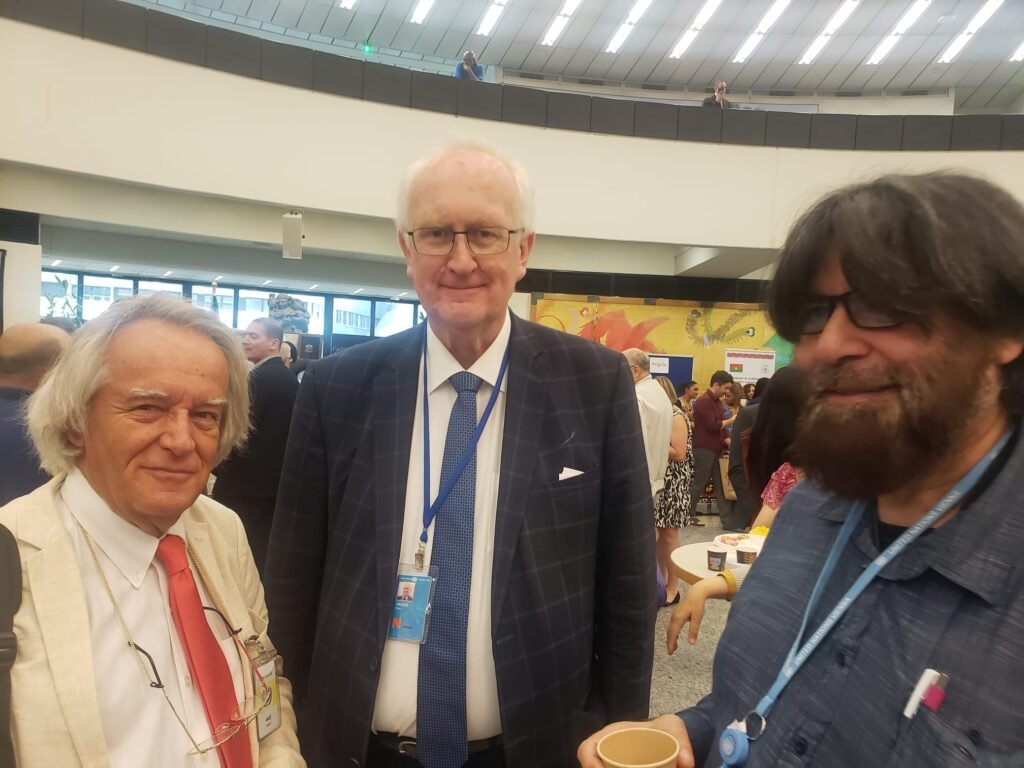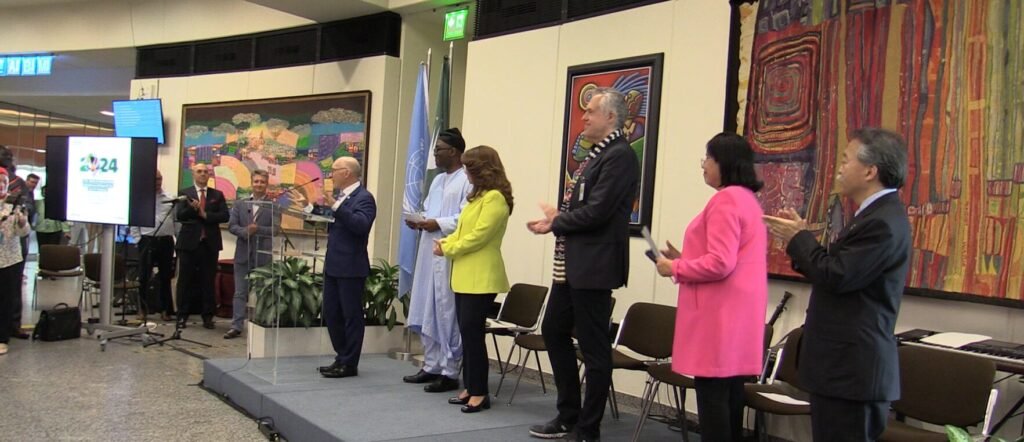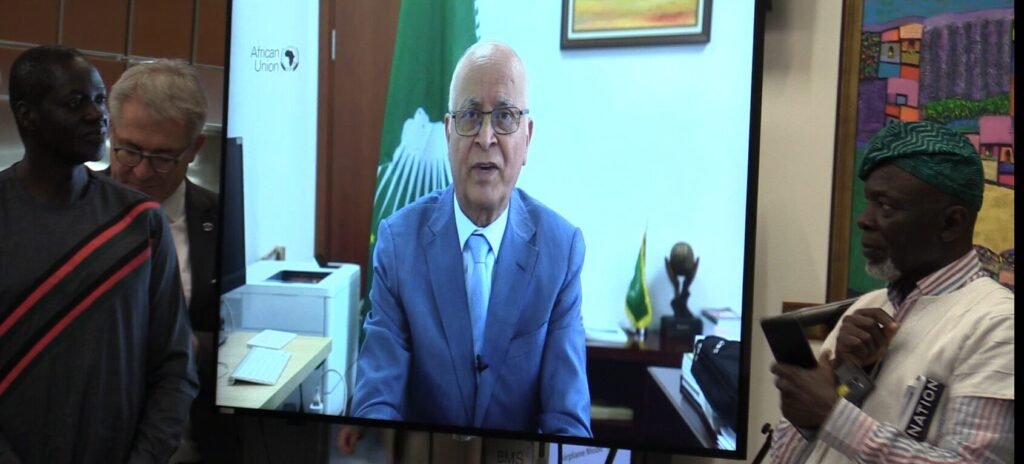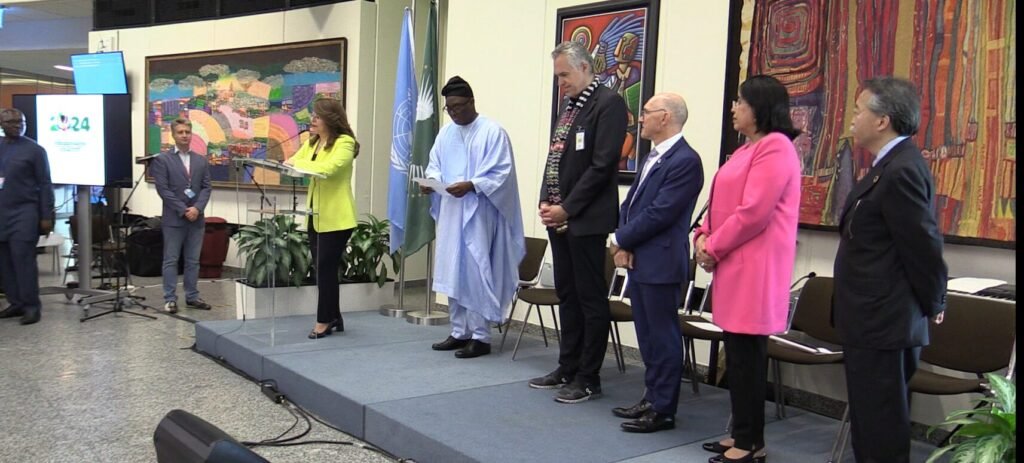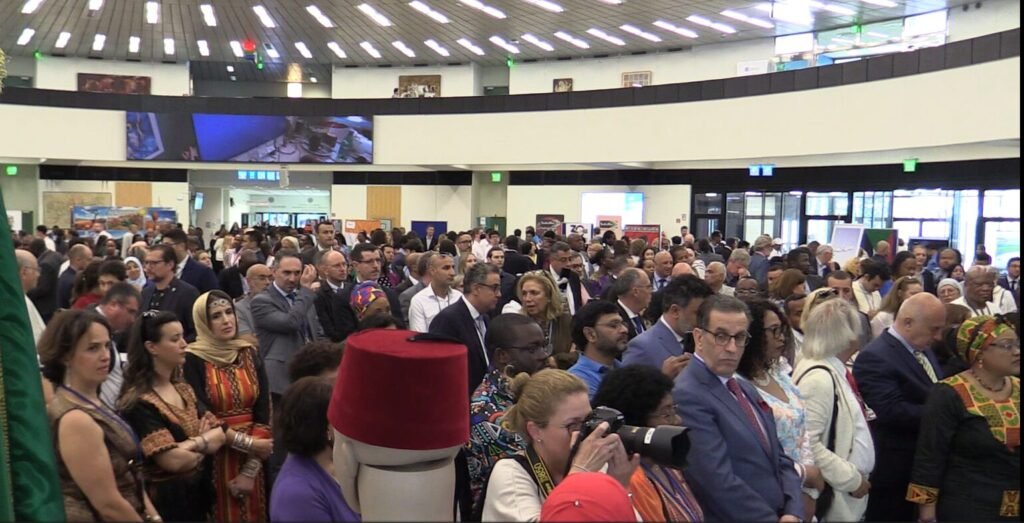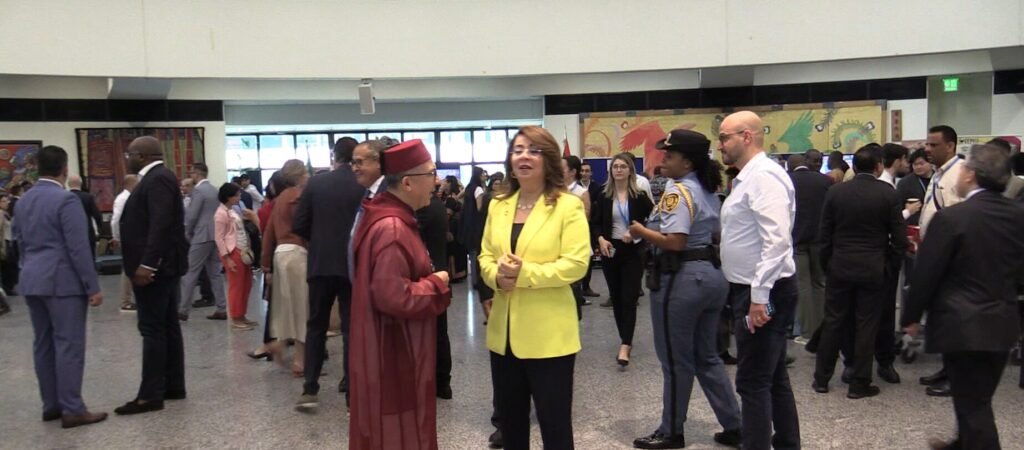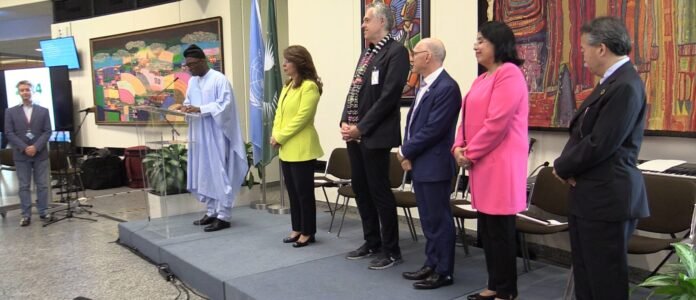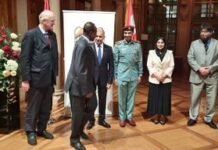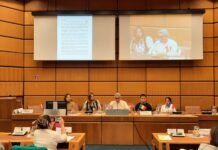On May 27, 2024, the city of Vienna was enveloped in a vibrant cultural atmosphere as it hosted the Africa Day celebration at the Rotunda in the Vienna International Centre. This annual event, which honours the establishment of the African Union, saw an unprecedented gathering of African embassies in Austria, each contributing to a spectacular showcase of the diverse and rich cultural heritage of the African continent. The Rotunda was transformed into a lively hub of activity, reflecting the spirit of unity and the dynamic cultural tapestry of Africa.
The celebration of Africa Day in Vienna is a significant occasion that fosters cultural exchange and mutual understanding between Africa and Europe. African embassies took center stage, presenting a tapestry of traditions through music, dance, art, and culinary delights. The event not only highlighted the historical importance of Africa Day but also provided a platform for dialogue and collaboration between various African nations and the international community.
This year’s festivities were notable for their extensive participation and the wide array of activities that catered to attendees of all ages. From traditional dance performances and musical acts to art exhibitions and food stalls, the event was a feast for the senses. The Rotunda, with its architectural grandeur, served as the perfect backdrop for this cultural extravaganza, drawing in a diverse crowd eager to experience the vibrancy of African cultures.
The Africa Day celebration in Vienna underscored the importance of cultural diversity and intercultural dialogue. It provided an opportunity for Austrians and other international visitors to deepen their understanding of Africa’s rich cultural heritage. The event was a testament to the enduring ties between Africa and Europe and highlighted the role of cultural events in bridging cultural divides and fostering global unity.
The Opening Ceremony
The Africa Day celebration in Vienna commenced with an exceptional opening ceremony that truly set the stage for a day filled with cultural vibrancy and unity. The event began with a series of stirring speeches and captivating performances that encapsulated the essence of African culture and its significance in today’s global landscape.
Ambassador Johnson from the Ghanaian embassy delivered a keynote address that was both inspiring and thought-provoking. His speech emphasized the importance of unity and collaboration among African nations and the African diaspora. Ambassador Johnson highlighted the rich cultural heritage of Africa, underscoring the continent’s contributions to global arts, music, and literature. His words resonated deeply with the audience, setting a motivational tone for the day’s festivities.
Following the ambassador’s speech, a series of performances showcased the diverse musical and dance traditions of Africa. Traditional drummers and dancers from various African communities in Vienna took to the stage, their rhythmic beats and vibrant movements captivating the audience. These performances were not only a celebration of African culture but also a testament to the community’s enduring spirit and resilience.
The ceremony also featured a poignant moment of silence, honoring the ancestors and all those who have contributed to the rich tapestry of African history. This reflective interlude served as a reminder of the struggles and triumphs that have shaped the continent’s journey, fostering a sense of pride and reverence among attendees.
The opening ceremony concluded with a collective call to action, urging participants to engage actively in the day’s events and embrace the spirit of Africa Day. The combination of powerful speeches and dynamic performances provided a compelling start, ensuring that the celebration was both meaningful and memorable.
Cultural and Social Activities
Africa Day in Vienna offered a dynamic array of cultural and social activities that captivated attendees and celebrated African heritage in all its diversity. The event featured traditional dances that brought the vibrancy of Africa to life. Dancers adorned in colorful attire performed routines that showcased the rich tapestry of African rhythms and movements. These performances not only entertained but also educated the audience about the significance of dance in African cultures, making it a memorable experience for all present.
Art displays were another highlight, presenting a stunning collection of works from both established and emerging African artists. The exhibits included a variety of mediums, such as paintings, sculptures, and textiles, each piece telling a unique story and reflecting the diverse artistic traditions of the continent. Visitors had the opportunity to engage with the artists, gaining insights into their creative processes and the cultural contexts of their work. This interaction fostered a deeper appreciation of African art and its role in expressing cultural identity.
Additionally, the event featured interactive workshops that allowed attendees to immerse themselves in African crafts and traditions. From beadwork and pottery to storytelling sessions, these workshops provided hands-on experiences that were both educational and enjoyable. Participants of all ages were able to create their own pieces of art, guided by skilled artisans who shared their knowledge and skills generously.
Social activities played a crucial role in fostering cultural exchange among attendees. The event included a variety of musical performances, ranging from traditional African music to contemporary Afrobeat, encouraging people to dance and celebrate together. Food stalls offering authentic African cuisine allowed visitors to taste the flavors of the continent, further enriching the cultural experience. These social interactions created a vibrant and inclusive atmosphere, where people from different backgrounds could come together to celebrate and learn about African traditions and heritage.
One of the most enchanting highlights of Africa Day in Vienna is the array of musical performances that bring the vibrant spirit of Africa to life. The celebration showcases a diverse lineup of African musical groups, each contributing to the rich tapestry of sounds that define the continent’s musical heritage. Central to this auditory feast is the rhythm of African drums, which are the heartbeat of the festivities. The powerful, resonant beats of the djembe and the intricate patterns of the talking drum create an immersive experience that captivates the audience.
Among the standout performers is Mamado Diabete’s ensemble from Burkina Faso, whose electrifying performances are a testament to Africa’s dynamic musical traditions. Diabete’s group masterfully blends traditional rhythms with contemporary influences, creating a sound that is both timeless and refreshingly modern. Their music, characterized by the harmonious interplay of the kora, balafon, and various percussion instruments, transports listeners to the heart of West Africa, offering a glimpse into the rich cultural heritage of the region.
The musical performances are further elevated by the captivating dances that accompany them. Dancers, adorned in vibrant traditional attire, move with a grace and energy that is both mesmerizing and infectious. Their choreographed routines, often telling stories of heritage and community, add a visual dimension to the musical experience, making it a multi-sensory celebration of African culture.
In addition to Mamado Diabete’s ensemble, numerous other groups from across Africa contribute to the day’s musical offerings, each bringing their unique sound and style. From the high-energy beats of Afrobeat to the soulful melodies of South African gospel, the variety of performances ensures that there is something for everyone to enjoy. These musical acts not only entertain but also educate the audience about the diverse musical traditions of Africa, fostering a deeper appreciation for the continent’s cultural richness.
Africa Day in Vienna is not just a celebration of culture, music, and dance; it is also a culinary journey through the diverse and rich flavors of the African continent. The festival features an array of food stands that offer a tantalizing selection of African cuisine, representing the gastronomic diversity of the continent. Each food stand is a window into the culinary traditions of various African countries, highlighting their unique ingredients and cooking techniques.
Among the many culinary offerings, the Sudanese food corner stood out with its array of traditional dishes. Sudanese cuisine, known for its bold flavors and hearty ingredients, attracted many visitors eager to taste something new. One of the standout dishes was aseedah, a popular Sudanese meal made from cooked wheat flour, often served with a flavorful stew. This dish is a staple in Sudanese households, providing a comforting and nourishing meal.
Another highlight was naymyah, a traditional Sudanese dish that combines meat, spices, and a rich tomato sauce. This dish exemplifies the use of aromatic spices that are integral to Sudanese cooking, creating a symphony of flavors that dance on the palate. Additionally, the food corner featured tagalya, a dish made from a blend of meat, okra, and spices, showcasing the versatility and depth of Sudanese culinary traditions.
No visit to the Sudanese food corner would be complete without trying aradeeb, a popular drink made from tamarind. This refreshing beverage, with its sweet and tangy flavor, is a favorite among Sudanese people and provided a perfect complement to the rich and savory dishes on offer.
The culinary delights at Africa Day in Vienna provided a wonderful opportunity for attendees to experience the diverse and vibrant flavors of the African continent. The Sudanese food corner, with its rich and varied offerings, was a testament to the rich culinary heritage of Sudan, offering a delightful and memorable experience for all who visited.
Diplomatic participation significantly enhances the cultural tapestry of Africa Day in Vienna. Embassies from various African nations play a pivotal role in the festivities, contributing to the event’s international flair. These diplomatic missions not only showcase the rich cultural heritage of their respective countries but also foster a spirit of unity and cooperation among the diverse attendees.
The presence of diplomatic representatives from countries across Africa provides a unique opportunity for cultural exchange and bilateral dialogue. Embassies set up vibrant stalls that display traditional arts, crafts, and culinary delights, offering visitors a sensory journey through the continent. These stalls become hubs of activity, where diplomats engage with the public, share stories, and promote the cultural richness of their homelands.
Moreover, the event serves as a platform for strengthening international relations. Diplomatic representatives engage in discussions with their counterparts from other nations, exploring avenues for collaboration and mutual support. This interaction is not limited to African nations; embassies from non-African countries also participate, reflecting Vienna’s status as a global hub for diplomacy. These exchanges contribute to a better understanding of Africa’s role in the global community and highlight the importance of partnership and solidarity.
Visitors to Africa Day in Vienna benefit immensely from these diplomatic interactions. They gain insights into the diverse cultural and geopolitical landscapes of Africa, fostering a sense of global awareness and appreciation. The event thereby not only celebrates African culture but also underscores the significance of international cooperation and cultural diplomacy.
In essence, the involvement of diplomatic missions at Africa Day in Vienna underscores the event’s importance as a cultural and diplomatic gathering. It brings together a myriad of voices, promoting intercultural dialogue and enhancing international connections, making it a truly global celebration.
Sudan’s Significant Role
Sudan’s participation in the Africa Day celebrations in Vienna stands out as a prominent example of cultural diplomacy and engagement. The presence of H.E. Magdi Ahmed Mofadal, the Ambassador of Sudan to Austria, underscored the importance Sudan places on fostering international cultural exchange. His involvement was instrumental in highlighting Sudan’s rich cultural heritage and its commitment to unity within the African diaspora.
The Sudanese embassy in Vienna played a crucial role in organizing and facilitating the country’s representation at the event. Through a series of well-coordinated efforts, the embassy extended invitations to key representatives from various Sudanese organizations based in Vienna. These organizations, which include cultural groups, community associations, and academic bodies, were pivotal in showcasing the diverse aspects of Sudanese culture.
At the event, Sudan’s contributions were multifaceted. Traditional music and dance performances captivated the audience, providing a glimpse into the vibrant artistic traditions of the country. Additionally, the culinary delights offered at the Sudanese stalls were a testament to the nation’s rich culinary heritage, featuring dishes that are both flavorful and emblematic of Sudanese hospitality.
The participation of Sudanese organizations was not limited to cultural displays alone. There were also discussions and presentations that provided insights into Sudan’s historical and contemporary significance within Africa. These sessions were well-received and contributed to a deeper understanding of Sudan’s role in the regional and global context.
Overall, Sudan’s active involvement in the Africa Day celebrations in Vienna served as a bridge, connecting the Sudanese community with the broader African diaspora and the international audience. It highlighted the country’s cultural wealth and fostered a spirit of unity and collaboration, making Sudan’s participation a memorable highlight of the event.
Memorable Moments and Conclusion
The Africa Day celebration in Vienna was a vibrant cultural extravaganza that left attendees with a myriad of cherished memories. One of the standout moments was the group photo featuring the ambassadors of Sudan and Ghana, which evoked the historic spirit of the 1970 Africa Cup final. This symbolic gesture highlighted the enduring bonds and shared history between African nations, resonating deeply with the audience.
The celebration offered a rich tapestry of experiences, from traditional dance performances to mouth-watering African cuisine. Visitors were treated to an array of cultural showcases, including music that spanned the diverse regions of the continent. The rhythmic beats and soulful melodies provided a sensory journey into the heart of Africa, leaving many with a newfound appreciation for its artistic heritage.
Furthermore, the marketplace was a hub of activity, featuring artisanal crafts and vibrant textiles that captured the essence of African craftsmanship. Attendees had the opportunity to engage with artisans, learning about the intricate techniques and cultural significance behind each piece. This interaction not only fostered a deeper understanding of African culture but also supported the artisans by recognizing the value of their work.
The educational sessions and panel discussions were another highlight, offering insights into Africa’s socio-economic developments, challenges, and opportunities. These sessions provided a platform for meaningful dialogue, encouraging visitors to consider Africa’s role on the global stage and its future potential. The exchange of ideas was both enlightening and inspiring, prompting many to reflect on how they could contribute to a positive narrative about Africa.
As the celebration drew to a close, it was evident that the event had a profound impact on all who attended. The exposure to Africa’s rich cultural heritage left visitors feeling enriched and inspired. The Africa Day celebration in Vienna was not just a festivity but a bridge connecting people through cultural appreciation and mutual respect. It served as a reminder of the beauty of diversity and the power of unity, leaving an indelible mark on the hearts and minds of those who participated.


